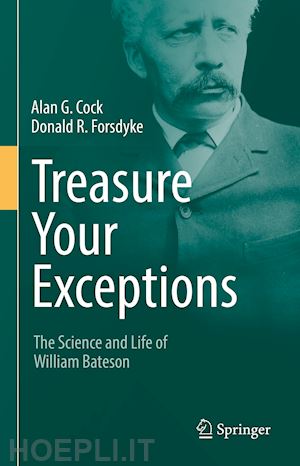

Questo prodotto usufruisce delle SPEDIZIONI GRATIS
selezionando l'opzione Corriere Veloce in fase di ordine.
Pagabile anche con Carta della cultura giovani e del merito, Carta della Cultura e Carta del Docente
William Bateson brought the work of Mendel (and much more) to the attention of the English-speaking world. He commanded the biological sciences in the decades after Darwin's death in 1882. To understand these years we must first understand Bateson. Through examination of the life of a major contributor to the turn-of-the-nineteenth-century revolution in biology, the authors reconcile the genocentrism of George Williams and Richard Dawkins with the hierarchical thinking of Richard Goldschmidt and Stephen Jay Gould. Aided by Rebecca Saunders, Bateson invented much of the basic terminology of modern genetics and, when addressing Darwin's great problem – the origin of species, introduced the mysterious term "the residue." While the first edition of this work (2008) related "residue" to relative concentrations of bases in DNA, the second edition reveals this as reflecting fundamental differences in short strings of bases. Thus, the book has come to represent not only Bateson’s science and life, but also a revised history of the biosciences that is likely to be increasingly visited, both by scientists and by those who wish to fully understand contemporary debates on racial, eugenic and gender aspects of genetics. In a nutshell, the book describes what we, in modern terms, would call a "colossal intelligence failure." Mendel handed it to us "on a plate" in 1865 when Bateson was only 4. It took 35 years to "join the dots" with Bateson a primary joiner. Shrugged off by many 20th century scientists as a freak "blip" in what was really an orderly advance, the Mendel episode was but one of a succession of such "blips." Thus, a multiplicity of post-Mendelian "Mendels" emerge as the story of Bateson's life unfolds.
Peter Harper in Human Genetics (2009): "This book puts the record straight and one is left with a feeling of admiration for Bateson as both a scientist and a man, and with no doubt that he, more than anyone else, was largely responsible for the rapid progress in modern genetics during the first decade of the twentieth century."
Michael J. Wade in Evolution (2009): "I strongly recommend this book for its information on an important central figure and for its bringing to life the several controversies at the origins of Genetics. It greatly illuminates the conceptual foundations of evolutionary genetics."
Elof Axel Carlson in Quarterly Review of Biology (2009): "This volume will be of enormous benefit to historians of science who like to follow how ideas are born or die and why participants of different sides of each controversy held such rigid views of their own work and saw little merit in their competitor’s research."
Amitabh Joshi in Journal of Genetics (2010): "There is much in this book that I was not aware of, despite a formal training in genetics and a strong amateur interest in the history of biology.… It is certainly a book that any serious student of either genetics or evolution would greatly benefit from reading."
Alan Cock (1926–2005) was a son-in-law of a colleague of Tschermak, one of the botanist "rediscoverers" of Mendel. His undergraduate studies in Zoology at Cambridge led to work with Michael Pease (1947-57) at the Agricultural Research Council Poultry Genetics Unit. Since Pease had himself assisted Punnett, who was Bateson's main assistant, then Alan can be seen as Bateson's "scientific great grandson." After doctoral work in Genetics (Edinburgh 1962), he became lecturer in Zoology at the University of Southampton. In the early, pre-history, phase of his career, his work with Morten Simonsen provided a fundamental understanding of the graft-versus-host reaction (Immunology 1958 1, 103-110). In the 1960s he and Stephen Jay Gould were leaders in studies of animal growth and form (allometry; Q. Rev. Biol. 1966 41, 131-190). In the 1970s he repatriated, curated and catalogued the papers of William Bateson, and wrote several important papers on, and initiated a definitive biographyof, Bateson (later coauthored with Forsdyke). He corresponded and/or collaborated with many important mid-late-20th century figures.
Donald Forsdyke was born in London, UK (1938), and has degrees in Medicine (St. Mary's Hospital Medical School) and in Biochemistry (Ph.D, Cambridge University). He has engaged in research and teaching at the Department of Biochemistry, Queen's University, Kingston, Canada, since 1968. His research includes the concept and mechanism of positive selection of lymphocyte repertoires, discovery of the lectin pathway of complement activation, identification of lymphocyte activation genes, bioinformatic analyses of DNA sequences relating to introns and speciation, and biohistory with special reference to evolutionary biology and the roles of George Romanes, William Bateson and Samuel Butler. His interest in history derives from a belief that understanding how science has progressed in the past will aid its progress in the future.











Il sito utilizza cookie ed altri strumenti di tracciamento che raccolgono informazioni dal dispositivo dell’utente. Oltre ai cookie tecnici ed analitici aggregati, strettamente necessari per il funzionamento di questo sito web, previo consenso dell’utente possono essere installati cookie di profilazione e marketing e cookie dei social media. Cliccando su “Accetto tutti i cookie” saranno attivate tutte le categorie di cookie. Per accettare solo deterninate categorie di cookie, cliccare invece su “Impostazioni cookie”. Chiudendo il banner o continuando a navigare saranno installati solo cookie tecnici. Per maggiori dettagli, consultare la Cookie Policy.